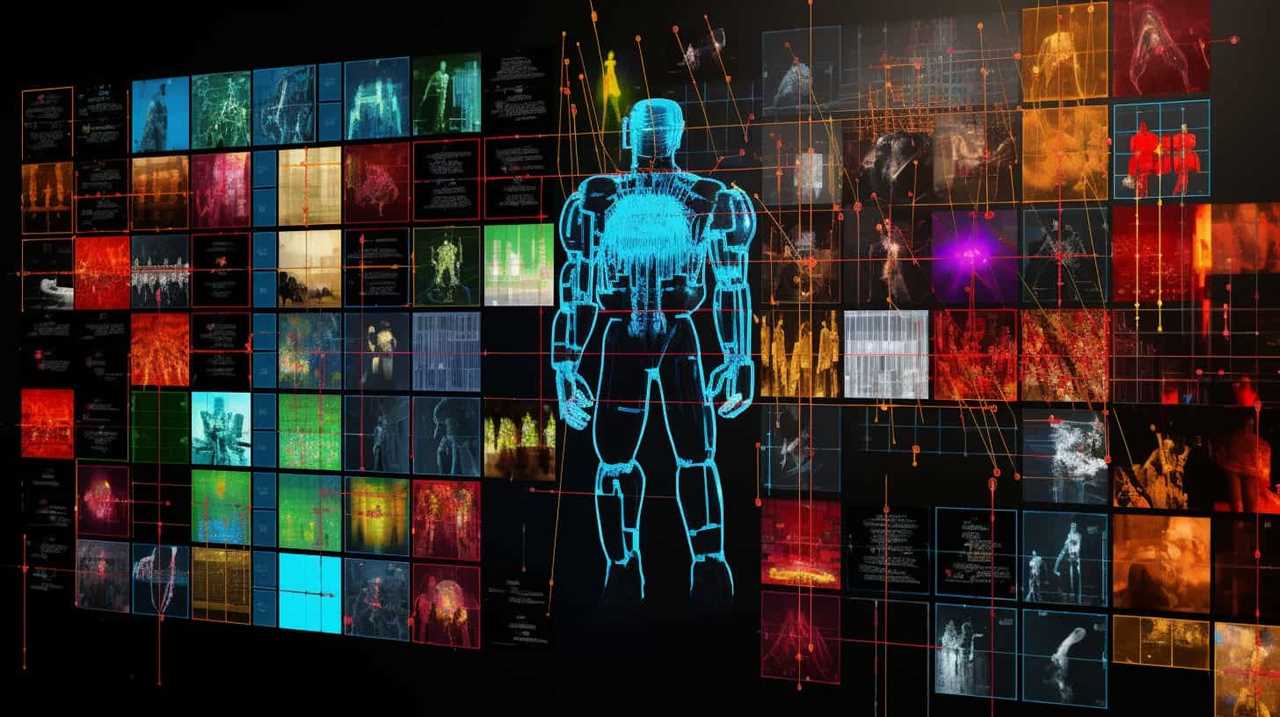Oh, the wonders of AI technology! It has brought us convenience, efficiency, and endless possibilities.
But as we delve deeper into the realm of artificial intelligence, we must also confront the ethical considerations that come with it.
In this article, we explore six key ethical considerations in AI technology. From privacy concerns to cultural biases, we aim to shed light on the complexities and challenges that arise in this ever-evolving landscape.
So, let’s embark on this journey together, seeking innovation while mindful of the ethical implications.
Key Takeaways
- Ensuring fairness in AI algorithms
- Addressing bias in training data
- Protecting personal data and implementing strong security measures
- Promoting transparency and explainability in AI algorithms

Ethical Implications of AI Algorithms
As AI algorithms become increasingly prevalent, we frequently encounter ethical implications that necessitate our attention and consideration.
One of the key ethical considerations in AI technology is ensuring fairness in AI algorithms. AI systems are designed to make decisions and predictions based on data, but if the data used to train these algorithms is biased, it can lead to unfair outcomes. For example, if an AI algorithm used in hiring processes is trained on historical data that contains bias, it may perpetuate discrimination against certain groups.
Another ethical implication is the unintended consequences of AI algorithms. While AI technology has the potential to bring about innovation and positive change, it can also have unintended negative consequences. For instance, AI algorithms used in autonomous vehicles can make split-second decisions, but there are concerns about the ethical implications of these decisions when faced with unavoidable accidents.
It’s crucial for us to address these ethical considerations to ensure that AI algorithms are fair and their unintended consequences are minimized.

Privacy Concerns in AI Technology
Privacy is a paramount concern when it comes to AI technology. With the increasing use of artificial intelligence in various aspects of our lives, the protection of personal data and the potential surveillance risks have become critical issues.
As AI systems rely heavily on data, there’s a need for robust data protection mechanisms to ensure that individuals’ privacy is safeguarded. This includes implementing strong security measures, obtaining informed consent, and providing individuals with control over their data.
Additionally, AI technology has the potential to enable extensive surveillance, raising concerns about the invasion of privacy and the misuse of personal information. Striking a balance between the benefits of AI and the protection of privacy is crucial in addressing these concerns and ensuring the responsible use of AI technology.

Cultural Biases in AI Decision-Making
One of the key ethical considerations in AI technology is the presence of cultural biases in AI decision-making. Cultural biases refer to the tendency of AI systems to favor certain groups or perspectives over others, leading to ethical implications and fairness concerns.
Here are four ways in which cultural biases can impact AI decision-making:
- Reinforcing stereotypes: AI algorithms trained on biased data can perpetuate stereotypes and discriminatory practices.
- Marginalizing underrepresented groups: If AI systems aren’t trained on diverse data, they may overlook the needs and perspectives of marginalized communities.
- Amplifying existing inequalities: Biased AI decision-making can exacerbate existing social, economic, and political inequalities.
- Lack of cultural context: AI may struggle to understand and accurately interpret cultural nuances, leading to inappropriate or unfair decisions.
Addressing cultural biases in AI decision-making is crucial to ensure fairness, equity, and inclusivity in the development and deployment of AI technology.

Accountability and Transparency in AI Systems
Moving forward, we’ll now delve into the importance of accountability and transparency in AI systems. Fairness in AI decision-making and addressing algorithmic bias are crucial for the ethical development and deployment of AI technology.
Accountability ensures that those responsible for creating and using AI systems are held answerable for their actions. It requires clear guidelines and standards to be established, along with mechanisms for auditing and oversight.
Transparency is equally essential as it promotes trust and understanding in AI systems. It involves making the decision-making process and the underlying algorithms more accessible and explainable. This allows for a better understanding of how AI systems operate and helps identify and mitigate biases that may be present.

Legal and Regulatory Challenges in AI Development
To address the legal and regulatory challenges in AI development, we must establish clear guidelines and standards that govern the responsible creation and use of AI systems. This is crucial in ensuring that AI technology is developed and deployed in a manner that protects individual rights and promotes societal well-being.
Here are four key considerations for legal and regulatory challenges in AI development:
- Data Governance: Implementing robust data governance frameworks that address issues of data privacy, security, and ownership is essential to safeguarding individuals’ rights and preventing misuse of personal information.
- Algorithmic Bias: Developing mechanisms to identify and mitigate algorithmic bias is crucial to ensure that AI systems don’t perpetuate discriminatory practices or unjust outcomes.
- Accountability: Establishing mechanisms to hold developers and users of AI systems accountable for their actions is necessary to foster trust and ensure responsible use of AI technology.
- Regulatory Frameworks: Developing comprehensive and adaptable regulatory frameworks that keep pace with the rapid advancements in AI technology is essential to strike a balance between innovation and protection.

Frequently Asked Questions
What Are the Potential Social Impacts of AI Algorithms and How Can They Be Mitigated?
The potential social impacts of AI algorithms are a matter of ethical implications and social responsibility. We must address these concerns to ensure that innovation in AI technology is balanced and benefits society as a whole.
How Do Privacy Concerns Manifest in AI Technology and What Steps Can Be Taken to Protect User Data?
Privacy concerns in AI technology arise due to potential misuse and unauthorized access to user data. To protect user data, steps should be taken, such as implementing strong encryption, ensuring informed consent, and establishing robust data protection regulations.
How Do Cultural Biases Influence AI Decision-Making and What Measures Can Be Implemented to Minimize Their Impact?
Cultural biases have a profound impact on AI decision-making. To minimize their effects, ethical safeguards must be implemented. We must ensure that AI systems are trained on diverse datasets and have built-in mechanisms for bias detection and mitigation.
What Are the Best Practices for Ensuring Accountability and Transparency in AI Systems?
Ensuring transparency in AI decision making and establishing clear lines of accountability in AI systems are crucial for responsible and ethical use of AI technology. These practices promote trust, fairness, and mitigate potential biases.
What Are the Current Legal and Regulatory Challenges Faced in the Development of AI and How Can They Be Addressed?
Legal and regulatory challenges in AI development must be addressed to ensure accountability and transparency. We need to navigate the complexities of privacy, data protection, and intellectual property, while fostering innovation and creating a framework that safeguards against potential risks.

Conclusion
In conclusion, it’s imperative that we navigate the ethical considerations surrounding AI technology with caution and mindfulness.
As the saying goes, ‘The devil is in the details.’ We must ensure that AI algorithms are developed with ethical implications in mind, privacy concerns are addressed, cultural biases are minimized, and accountability and transparency are prioritized.
Additionally, legal and regulatory challenges must be tackled to ensure responsible and beneficial AI development.
By doing so, we can harness the potential of AI while safeguarding our values and societal well-being.
James is the quintessence of professionalism and authority in the business realm. With years of experience navigating the complexities of the corporate world, he brings an unparalleled depth of knowledge and insight to our team. James’s analytical skills and business acumen allow him to dissect and present news stories with clarity and precision, offering our readers a comprehensive understanding of the latest business trends and economic shifts.










